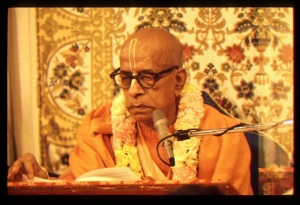CC Madhya 25.196 (1975)

A.C. Bhaktivedanta Swami Prabhupada
TEXT 196
- keha kahe,-ei nahe, 'alpa' doṣa haya
- śuniyā rahilā rāya kariyā saṁśaya
SYNONYMS
keha kahe—some of the learned brāhmaṇas said; ei—this; nahe—not; alpa—insignificant; doṣa—fault; haya—is; śuniyā—hearing; rahilā—remained; rāya—Subuddhi Rāya; kariyā—making; saṁśaya—doubt.
TRANSLATION
When Subuddhi Rāya consulted some other brāhmaṇas, they told him that he had not committed a grievous fault and that consequently he should not drink hot ghee and give up his life. As a result, Subuddhi Rāya was doubtful about what to do.
PURPORT
This is another instance of Hindu custom. One brāhmaṇa would give advice condoning a particular fault, and another would give advice to the contrary. Typically, lawyers and physicians differ, giving one kind of instruction and then another. Due to the brāhmaṇas' different opinions, Subuddhi Rāya became further perplexed. He did not know what to do or what not to do.